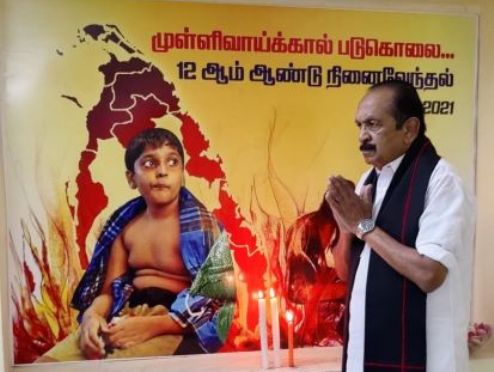The Mulliwaikkal divergence
How ceremonies marking the end of the war on May 18 and 19 are keeping up an entrenched conflict between Sinhala and Tamil nationalisms
By P. K. Balachandran
COLOMBO – The annual ceremonies held by the Sri Lankan armed forces on May 19, to mark the defeat of the separatist Liberation Tigers of Tamil Eelam (LTTE) and the observances held by Tamil political leaders on May 18 to mark what they consider ‘genocide’, keep alive the conflict between Sinhalese and Tamil nationalisms, which have marked post-independence Sri Lankan politics.
This year, to prevent the Tamils from commemorating their dead at Mulliwaikkal (the scene of mass killings at the tail of the 30-year war) the Sri Lankan government has used the COVID-19 pandemic to isolate the place along with the adjacent areas of Mullaitivu, Pudukudiyiruppu, and Mulliyawali.
Over the years, the observances of the Tamils on May 18 have gained international attention thanks to the growing influence of the Tamil Diaspora and the active post-war involvement of the international community headed by the US and its Western allies under the umbrella of the UN Human Rights Council (UNHRC).
In response to this, Sri Lankan governments have reacted through sharp denials, maintaining the charge of genocide is based on biased inputs from interested parties.
The high point on the 12th anniversary of the end of the war this year is the passing of a bill in the Ontario provincial legislature on ‘genocide’ in Sri Lanka. Bill 104, the Tamil Genocide Education Week Act, establishes seven days each year, May 11 to 18, during which Ontarians “are encouraged to educate themselves about, and to maintain their awareness of, the Tamil genocide and other genocides that have occurred in world history”.
Infuriated by the ‘genocide Bill’ passed by Ontario Legislative assembly, Foreign Minister Dinesh Gunawardena summoned Canadian High Commissioner David McKinnon and expressed Sri Lanka’s deep concern. The minister pointed out that the position taken by the Ontario Legislative Assembly contradicted the Canadian Government’s stand.
Foreign Secretary Jayanath Colombage pointed out to the Canadian High Commissioner the potential harm Bill 104 could cause to the reconciliation process, peace building in Sri Lanka and bilateral relations.
Amidst the diplomatic push back, unidentified persons on May 12 destroyed a memorial ‘thupi’ (stupa or memorial in Tamil) for the Tamils who were killed in Mulliwaikkal in the last days of the war. Stones kept for building a better stupa had been removed to ensure Tamil politicians and their followers who gather there to pay homage on May 18, would not have a focal point. The Tamils suspect the army had done it, though the army, as well as the government has denied it.
Reacting to this, the former Chief Minister of the Northern Province, C. V. Wigneswaran, who is now an MP, issued a press release saying the government’s efforts to hide the ‘genocide’ will fail because, one day, the international community would surely recognize what happed in Mulliwaikkal was genocide. He appealed to the Tamils to observe the day, but strictly in accordance with pandemic regulations.
The Democratic Peoples’ Front leader Mano Ganesan condemned the destruction of the monument and pointed that the government could not prevent Tamils from mourning their war dead while allowing the revolutionary Sinhala organization Janatha Vimukthi Peramuna (JVP) from paying homage to its dead. He appealed to Tamil leaders to seek the support of progressive Sinhalese politicians and Buddhist monks for their reasonable demand for equality in commemorating the dead in conflicts.
In the Indian State of Tamil Nadu, home to nearly 70 million Tamils, Tamil nationalists, LTTE and Tamil Eelam supporters have already started observing Mulliwaikkal Day. The Marumalarchi Dravida Munnetra Kazhagam (MDMK) leader Vaiko, who is an MP, paid homage to the dead. The object of veneration for him and his followers, was a map of Tamil Eelam with a picture of the 12-year-old Balachandran, the slain son of LTTE chief Velupillai Prabhakaran, superimposed on it.
Meanwhile www.army.lk said the Sri Lankan Security Forces were all set to remember the fallen war heroes at the National ‘Ranaviru’ monument in Battarmulla on May 19. The ceremony would be witnessed by President Gotabaya Rajapaksa and other dignitaries of the Sri Lankan State.
The website said that 23,962 army, 1160 navy, 443 air force, 2598 police and 456 civil security personnel, a total of 28,619, had made the supreme sacrifice in the fight against LTTE terrorism before May 2009.
-ENCL


